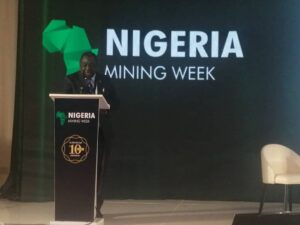By: Goodluck E. Adubazi, Abuja.
Industry leaders and policy experts at the Nigeria Mining Week 2025, On Wednesday, 15th October, in Abuja have emphasized the need for a homegrown, intentional strategy to unlock Nigeria’s vast mineral wealth and strengthen local participation in the mining sector.
Speaking during the technical session themed “Leveraging Domestic Experience: The Need for a Homegrown Strategy for Advancing the Minerals and Mining Sector”, Prof. Akinade Shadrach Olatunji, Senior Applied Consultant at Rapid Link Resources, drew parallels between Nigeria’s oil sector success and what could be achieved in solid minerals if guided by deliberate government policy and implementation.
Prof. Olatunji reminded participants that Nigeria’s oil industry did not achieve its current status by chance, but through successive, intentional policies that empowered local players.

“When we look back, the growth of the oil sector came from government’s deliberate decision to give indigenous firms opportunities — from marginal fields to full-fledged policies that prioritized Nigerians,” he said.
He urged the solid minerals sector to replicate the same model that birthed strong indigenous oil and gas companies, emphasizing that success in mining requires both policy continuity and local capacity building.
He noted that Policy Without Action Is Empty — Call for Real Implementation
While commending the Ministry of Solid Minerals Development for introducing forward-looking policies such as the ban on unprocessed mineral exports, Olatunji challenged the government to ensure such policies move beyond rhetoric.
“It’s not enough to make policy announcements; we must walk the talk,” he said. “We need clear strategies to block loopholes, protect lawful operators, and create an enabling environment where legitimate businesses can thrive.”
He called for strong collaboration between the private sector and the ministry to track implementation progress and ensure policy outcomes translate into measurable growth for Nigeria’s mining economy.
Building Capacity for Local Miners
Prof. Olatunji also highlighted the need for access to financing, modern equipment, and credible geological data to empower local operators.
He proposed that the Nigerian Mining Development Company (NMDC) should play a pivotal role in establishing machinery leasing hubs across key mining clusters.
“Most artisanal and small-scale miners can’t afford heavy machinery,” he noted. “If government facilitates access to equipment through leasing or cooperatives, it will transform productivity, create jobs, and strengthen compliance with mining regulations.”
Olatunji stressed that reliable geological data remains the foundation for any mining revolution, urging the government to invest heavily in data generation and accessibility.
Without accurate data, investors will remain skeptical,” he said. “Government must prioritize the release and digitization of geological datasets so investors and operators can make informed decisions.”
He added that some basic geological information should be made freely available to legitimate operators, as this would reduce barriers to entry and promote transparency.
In another high-level panel session themed “Power–Mining Integration in Nigeria: Opportunities and Risks”, Rahila Thomas, Country Director at Energy Market and Rates Consultants (EMRC) Nigeria and Co-founder of the Energy and Industrial Policy Commission, Nigerian Economic Summit Group (NESG), highlighted the symbiotic relationship between the mining and power sectors.
“Mining and power are two underserved markets that can unlock each other’s growth if strategically integrated,” she said.
Rahila Thomas explained that mining companies rely on continuous and affordable electricity, while the power sector depends on large, stable off-takers like mining companies to make investments bankable.
Rahila revealed that Nigeria currently has over 8 gigawatts (GW) of installed generation capacity that could be activated if mining companies and large industrial users invest in transmission and distribution infrastructure.
She urged miners to leverage the Eligible Customer Regulation to transition from costly and polluting captive power generation to cleaner, grid-based energy sources, enabling them to earn carbon credits and boost competitiveness in export markets.
“This shift won’t just reduce costs — it will make Nigerian mining more sustainable and globally competitive,” she added.
A Win–Win for Utilities and Industry
According to Thomas, integrated power–mining collaboration will benefit all stakeholders:
Mining companies gain reliable and cheaper power;
Communities enjoy improved grid access and industrial growth.
She concluded that such synergy could transform Nigeria’s energy landscape, attracting long-term investments and modernizing infrastructure for sustainable development.
As Nigeria seeks to diversify beyond oil, speakers at the Nigeria Mining Week 2025 made it clear: the path to prosperity lies in intentional government action, local empowerment, data-driven decision-making, and sectoral integration.
The message from Abuja was unified — Nigeria must mine smarter, power deeper, and plan intentionally to turn its mineral promise into tangible wealth.